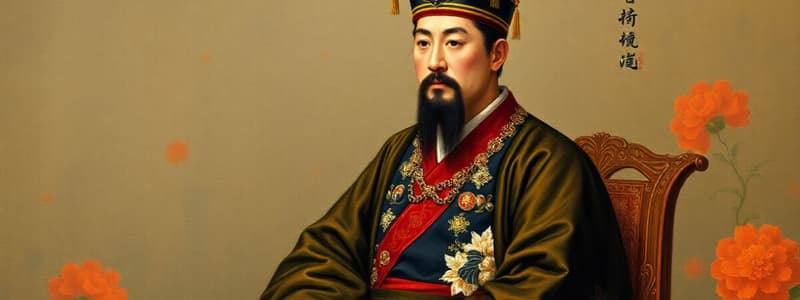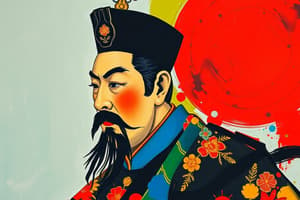Podcast
Questions and Answers
The Emperor of Japan held significant political power during the shogunate period.
The Emperor of Japan held significant political power during the shogunate period.
False (B)
The Meiji Restoration marked a significant turning point in Japan's history by restoring the Emperor's authority.
The Meiji Restoration marked a significant turning point in Japan's history by restoring the Emperor's authority.
True (A)
Shintoism is the indigenous religion of Japan and regards the Emperor as its highest authority.
Shintoism is the indigenous religion of Japan and regards the Emperor as its highest authority.
True (A)
After World War II, Emperor Hirohito maintained his divinity and continued to hold political power.
After World War II, Emperor Hirohito maintained his divinity and continued to hold political power.
The governance of Japan throughout its history has always been centralized in the hands of the Emperor.
The governance of Japan throughout its history has always been centralized in the hands of the Emperor.
The Meiji Restoration initiated a series of political reforms aimed at modernization and industrialization in Japan.
The Meiji Restoration initiated a series of political reforms aimed at modernization and industrialization in Japan.
Daimyo were the de facto rulers of Japan during the Meiji Restoration.
Daimyo were the de facto rulers of Japan during the Meiji Restoration.
The concentration of power in Japan during World War II led to peace and reconciliation.
The concentration of power in Japan during World War II led to peace and reconciliation.
Emperor Hirohito was viewed as a figurehead for the Japanese people during World War II.
Emperor Hirohito was viewed as a figurehead for the Japanese people during World War II.
The Emperor's role in post-war Japan was primarily that of a political leader.
The Emperor's role in post-war Japan was primarily that of a political leader.
Flashcards
Emperor's Role in Shintoism
Emperor's Role in Shintoism
The Emperor is regarded as the highest authority in Shinto, Japan's indigenous religion.
Shogunate
Shogunate
The military government in Japan before the Meiji Restoration, led by shoguns.
Meiji Restoration
Meiji Restoration
The 1868 period that restored the Emperor's power and initiated Japan's modernization.
Emperor Hirohito
Emperor Hirohito
Signup and view all the flashcards
Seremony vs. Power
Seremony vs. Power
Signup and view all the flashcards
Impact of World War II
Impact of World War II
Signup and view all the flashcards
Daimyo
Daimyo
Signup and view all the flashcards
Centralized Government
Centralized Government
Signup and view all the flashcards
Imperialistic Policies
Imperialistic Policies
Signup and view all the flashcards
Symbol of Unity
Symbol of Unity
Signup and view all the flashcards
Study Notes
The Emperor's Role in Japanese Religion and History
- Shintoism views the Emperor as the highest authority
- The Emperor and his family are a significant historical figure in Japan
- Before the Meiji Restoration (1868), the shoguns held real power, not the Emperor, whose role was ceremonial
- The Meiji Restoration marked a shift in power, restoring the Emperor's authority and making him a symbol of Japan's unity
- This restoration started political and social reforms to modernize Japan
- World War II drastically changed the Emperor's role—Emperor Hirohito renounced his divinity and became a constitutional monarch with no political power. This signaled a change from a figurehead to a symbol for peace and reconciliation.
- Before the Meiji Restoration, Japan was centered around regional warlords (daimyo)
- The Meiji Restoration established a more centralized government with the Emperor at its helm.
- The Meiji Restoration improved national unity
- Changes to the Emperor's power influenced Japan's modernization and development
- Post-war Japan's constitutional monarchy led to a more democratic and fairer system
- Studying the Japanese monarchy helps understand the complexities between religion, politics, and society in Japan.
Studying That Suits You
Use AI to generate personalized quizzes and flashcards to suit your learning preferences.




